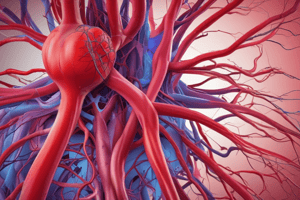Podcast
Questions and Answers
What primarily determines mean arterial pressure (MAP)?
What primarily determines mean arterial pressure (MAP)?
- Total blood volume only
- Blood viscosity
- Cardiac output and vascular resistance (correct)
- Heart rate alone
How does blood pressure change as it moves from arteries to veins?
How does blood pressure change as it moves from arteries to veins?
- It fluctuates dramatically
- It increases sharply
- It remains constant throughout
- It decreases sharply (correct)
What is the main driving force for blood flow in the circulatory system?
What is the main driving force for blood flow in the circulatory system?
- Pressure difference between arterial and venous sides (correct)
- Vascular resistance
- Blood volume
- Heart rate
What does the equation Q = ΔP/R imply about blood flow?
What does the equation Q = ΔP/R imply about blood flow?
What role do arterioles play in the circulatory system?
What role do arterioles play in the circulatory system?
What happens to arterial blood volume during the ejection of blood into the arterial system?
What happens to arterial blood volume during the ejection of blood into the arterial system?
Which statement describes systemic blood pressure?
Which statement describes systemic blood pressure?
What is the relationship between mean arterial pressure (MAP) and blood flow?
What is the relationship between mean arterial pressure (MAP) and blood flow?
What factors determine cardiac output?
What factors determine cardiac output?
Which of the following equations represents the relationship between arterial pressure, cardiac output, and total peripheral resistance?
Which of the following equations represents the relationship between arterial pressure, cardiac output, and total peripheral resistance?
How does an increase in cardiac output affect arterial pressure?
How does an increase in cardiac output affect arterial pressure?
What primarily controls capillary flow?
What primarily controls capillary flow?
Which statement about stroke volume is true?
Which statement about stroke volume is true?
How do changes in arterial resistance influence blood pressure?
How do changes in arterial resistance influence blood pressure?
What characterizes the interaction between cardiac output and arterial resistance?
What characterizes the interaction between cardiac output and arterial resistance?
What does MAP stand for in cardiovascular physiology?
What does MAP stand for in cardiovascular physiology?
In the context of blood flow, what does an increased arterial volume result in?
In the context of blood flow, what does an increased arterial volume result in?
Which physiological factor is crucial for maintaining equilibrium between blood flow 'in' and 'out'?
Which physiological factor is crucial for maintaining equilibrium between blood flow 'in' and 'out'?
Which two major determinants are critical for defining cardiac output?
Which two major determinants are critical for defining cardiac output?
What role does the nervous system play in blood pressure regulation?
What role does the nervous system play in blood pressure regulation?
During which phase of the ECG does atrial depolarization occur?
During which phase of the ECG does atrial depolarization occur?
What primarily causes the high pressure observed in large systemic arteries?
What primarily causes the high pressure observed in large systemic arteries?
Which of the following correctly describes the pulsatile nature of major arteries?
Which of the following correctly describes the pulsatile nature of major arteries?
What effect does an increase in stroke volume have on arterial blood pressure?
What effect does an increase in stroke volume have on arterial blood pressure?
Which part of the nervous system primarily regulates blood vessel constriction?
Which part of the nervous system primarily regulates blood vessel constriction?
Which of these is NOT a direct measure of cardiac output?
Which of these is NOT a direct measure of cardiac output?
Flashcards are hidden until you start studying
Study Notes
Mean Arterial Pressure (MAP)
- MAP is crucial for determining blood flow in the body.
- High arterial pressure is observed in major arteries, showing a pulsatile nature (systolic and diastolic readings).
- Blood pressure decreases significantly across arterioles, capillaries, and venules, leading to low resistance and low pressure in veins.
- A large pressure difference (ΔP) between arterial and venous sides creates a driving force for blood flow.
Haemodynamics
- Blood flow can be quantified using the equation: Flow = Pressure Difference / Resistance (Q = ΔP/R).
- MAP can also be calculated from blood flow (Q) and resistance (R): MAP = Q * R.
Ejection of Blood
- The ejection of blood from the heart maintains arterial blood volume and pressure by balancing inflow and outflow:
- "Blood flow in" from the heart fills arteries, increasing blood volume and pressure.
- "Blood flow out" through capillaries drains arteries, decreasing blood volume and pressure.
Cardiac Output and Arterial Resistance
- Cardiac output (CO) is the measure of blood flow "in" due to ventricular contraction and is central to maintaining blood pressure.
- Arterial resistance controls blood flow "out" to capillaries, influenced by the diameter of arteries.
- Changes in CO and resistance affect arterial pressure:
- Increasing CO raises inflow, increasing arterial pressure.
- Increasing resistance lowers outflow, contributing to higher arterial volume and pressure.
Cardiac Output Determinants
- Cardiac output is defined as the product of stroke volume (SV) and heart rate (HR): CO = SV x HR.
- Stroke volume is affected by the strength of cardiac contractions.
- Heart rate is influenced by the frequency of these contractions.
Blood Pressure Regulation
- Blood pressure regulation involves the interaction between the arterial and nervous systems to maintain stable MAP.
- Understanding these connections is vital for managing cardiovascular health.
Lecture Preparation Notes
- Familiarize with the concepts of cardiac output, its determinants, and how they impact arterial blood pressure.
- Review modules related to blood pressure and cardiac function for deeper understanding.
- Sample exam question: Identify the event occurring during the P wave in an ECG regarding atrial depolarization.
Studying That Suits You
Use AI to generate personalized quizzes and flashcards to suit your learning preferences.




